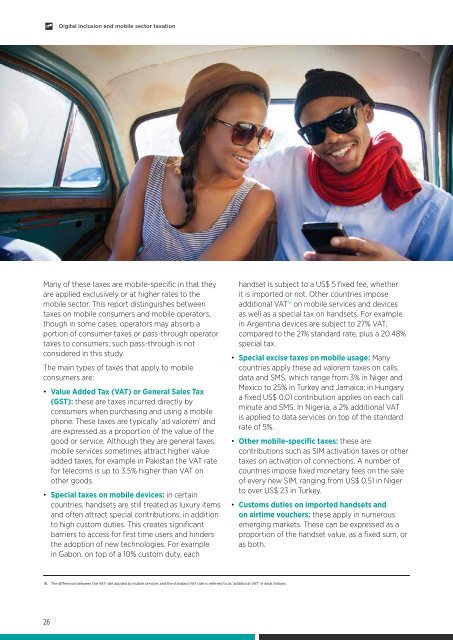You also want an ePaper? Increase the reach of your titles
YUMPU automatically turns print PDFs into web optimized ePapers that Google loves.
Digital inclusion and mobile sector taxation<br />
Many of these taxes are mobile-specific in that they<br />
are applied exclusively or at higher rates to the<br />
mobile sector. This report distinguishes between<br />
taxes on mobile consumers and mobile operators,<br />
though in some cases, operators may absorb a<br />
portion of consumer taxes or pass-through operator<br />
taxes to consumers; such pass-through is not<br />
considered in this study.<br />
The main types of taxes that apply to mobile<br />
consumers are:<br />
• Value Added Tax (VAT) or General Sales Tax<br />
(GST): these are taxes incurred directly by<br />
consumers when purchasing and using a mobile<br />
phone. These taxes are typically ‘ad valorem’ and<br />
are expressed as a proportion of the value of the<br />
good or service. Although they are general taxes,<br />
mobile services sometimes attract higher value<br />
added taxes, for example in Pakistan the VAT rate<br />
for telecoms is up to 3.5% higher than VAT on<br />
other goods.<br />
• Special taxes on mobile devices: in certain<br />
countries, handsets are still treated as luxury items<br />
and often attract special contributions, in addition<br />
to high custom duties. This creates significant<br />
barriers to access for first time users and hinders<br />
the adoption of new technologies. For example<br />
in Gabon, on top of a 10% custom duty, each<br />
handset is subject to a US$ 5 fixed fee, whether<br />
it is imported or not. Other countries impose<br />
additional VAT 18 on mobile services and devices<br />
as well as a special tax on handsets. For example<br />
in Argentina devices are subject to 27% VAT,<br />
compared to the 21% standard rate, plus a 20.48%<br />
special tax.<br />
• Special excise taxes on mobile usage: Many<br />
countries apply these ad valorem taxes on calls,<br />
data and SMS, which range from 3% in Niger and<br />
Mexico to 25% in Turkey and Jamaica; in Hungary<br />
a fixed US$ 0.01 contribution applies on each call<br />
minute and SMS. In Nigeria, a 2% additional VAT<br />
is applied to data services on top of the standard<br />
rate of 5%.<br />
• Other mobile-specific taxes: these are<br />
contributions such as SIM activation taxes or other<br />
taxes on activation of connections. A number of<br />
countries impose fixed monetary fees on the sale<br />
of every new SIM, ranging from US$ 0.51 in Niger<br />
to over US$ 23 in Turkey.<br />
• Customs duties on imported handsets and<br />
on airtime vouchers: these apply in numerous<br />
emerging markets. These can be expressed as a<br />
proportion of the handset value, as a fixed sum, or<br />
as both.<br />
18. The difference between the VAT rate applied to mobile services and the standard VAT rate is referred to as ‘additional VAT’ in what follows.<br />
26


